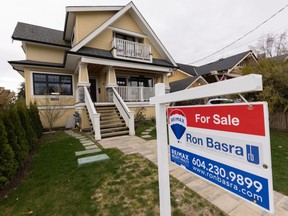In Vancouver, 106.4 per cent of the share of a median income was needed to cover ownership costs in the last three months of 2023, according to RBC figures

Article content
House affordability is at its worst in more than three decades across the country, with the Vancouver market in “full-blown” crisis, according to a new report from RBC, Canada’s largest bank.
And despite the potential for interest rate decreases sometime this year, there will be little relief for would-be homebuyers, according to the report, written by RBC assistant chief economist Robert Hogue.
Advertisement 2
Article content
Article content
Soaring interest rates have more than offset a slight dip in prices across the country, says the report.
High interest rates meant that Canadian households earning a median income of $85,400 needed to spend a staggering 63.5 per cent to cover the costs of owning an average home in the last three months of 2023, up from 61.8 per cent in the previous quarter, noted RBC. A decade ago, less than 40 per cent of median income was needed. In the early 2000s, it was in the low 30 per cent range.
The latest figures were worse in B.C.
In Vancouver, 106.4 per cent of the share of a median income was needed to cover ownership costs. In Victoria, that figure was 80.2 per cent.
Hogue said that especially in Vancouver you need to have a significantly high income or be able to make a very significant down payment to be able to afford a home.
“It does restrict the pool of potential buyers,” Hogue told Postmedia News. “It’s not that those who are priced out completely give up on their homeownership dreams. But for now, they are being pushed to the sidelines and could potentially stay there for an extended period of time.”
Article content
Advertisement 3
Article content
The monthly mortgage payment for the composite home (valued at $796,300) increased more than 3.3 per cent in the last three months of 2023 to $3,990. This rise occurred despite the composite home price easing slightly. The composite home includes all housing, including detached homes, townhouses and apartments.
Housing affordability fell in all markets that RBC tracks, with Vancouver, Victoria and Toronto experiencing the biggest deterioration.
Hogue doesn’t expect that home prices will skyrocket when interest rates fall, but noted that affordability will still be squeezed because of a 50 per cent increase in housing prices during COVID-19. The underpinning for increasing unaffordability, which pre-dated the pandemic, at its core is the inability for housing supply to meet very strong demand, noted Hogue.
In B.C., and particularly in the Lower Mainland, housing affordability has been a significant concern for years. The provincial government has taken steps to try to cool housing prices, including introducing measures such as a foreign buyers’ tax and an empty homes tax.
Advertisement 4
Article content
Premier David Eby’s NDP government has also taken control of municipal zoning, done away with public consultation on approved projects and will allow several units to be built on land previously designated for single family use in an effort to increase housing supply.
Housing affordability is expected to be a key issue in B.C.’s fall election and in next year’s federal election.
Tom Davidoff, an economics professor at the University of B.C.’s Sauder School of Business, says the RBC report is correct that housing affordability is at its worst level.
“It has gotten worse, and it keeps getting worse,” said Davidoff, director of the UBC centre for urban economics and real estate.
Home prices have fallen from their peak but nowhere near as much as the annual cost of ownership has increased due to the growth in interest rates, noted Davidoff.
Beginning two years ago, the Bank of Canada has delivered 10 interest hikes to raise rates 4.75 per cent. The Bank of Canada rate now stands at five per cent. The increases were meant to tame rampant inflation that had risen to 8.1 per cent in mid-2022, the highest in nearly four decades.
Advertisement 5
Article content
The inflation rate has now fallen to 2.78 per cent and the Bank of Canada has signalled that interest rate decreases are likely this year. The U.S. has similar intentions.
However, interest rate decreases may not translate into savings for homeowners and buyers.
“If rates come down, prices will probably rise dramatically. It’s kind of one-sided. I would have expected the large increase in interest rates to lead to a big reduction in price, but it just hasn’t happened,” observed Davidoff.
Recommended from Editorial
Bookmark our website and support our journalism: Don’t miss the news you need to know — add VancouverSun.com and TheProvince.com to your bookmarks and sign up for our newsletters here.
You can also support our journalism by becoming a digital subscriber: For just $14 a month, you can get unlimited access to The Vancouver Sun, The Province, National Post and 13 other Canadian news sites. Support us by subscribing today: The Vancouver Sun | The Province.
Article content





